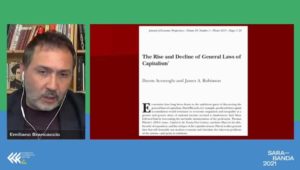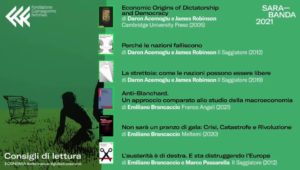Feltrinelli Foundation/Fondazione Feltrinelli (1 June 2021/ 1 giugno 2021)
DEREGULATION, CONCENTRATION OF POWER, CRISIS OF DEMOCRACY /
DEREGULATION, CONCENTRAZIONE DEL POTERE, CRISI DEMOCRATICA
Daron Acemoglu (MIT Boston), 2024 Nobel laureate and winner of the John Bates Clark Medal, is among the ten most cited economists in the world. Emiliano Brancaccio (University of Sannio) is one of the Italian members of alternative schools of economic thought. / Daron Acemoglu (MIT di Boston), vincitore del Nobel 2024 e della John Bates Clark Medal, attualmente è fra i dieci economisti più citati al mondo. Emiliano Brancaccio (Università del Sannio) è tra gli esponenti italiani delle scuole di pensiero economico critico.
See also / Si veda anche:
Brancaccio, E., De Cristofaro, F. (2022). In Praise of ‘general laws’ of Capitalism: Notes from a Debate with Daron Acemoglu. Review of Political Economy. First published online: 2 March. DOI: 10.1080/09538259.2022.2037930
Emiliano Brancaccio e Fabiana De Cristofaro, Elogio delle “leggi generali” del capitalismo. Note da un dibattito con Daron Acemoglu (in E. Brancaccio, Democrazia sotto assedio, Piemme Mondadori, 2022).
VERSIONE IN ITALIANO / ITALIAN VERSION
VERSIONE IN INGLESE / ENGLISH VERSION
RASSEGNA STAMPA/PRESS
Democrazia sotto assedio. Dibattito tra Acemoglu e Brancaccio (Il Ponte 4-2021)
Un dibattito tra Acemoglu e Brancaccio
Acemoglu e Brancaccio: “democrazia a rischio”
L’economia fuori dagli schemi di Brancaccio e Acemoglu
Intervista ad Acemoglu e segnalazione dibattito
DOPO IL NOBEL
“Nobel ad Acemoglu? Un anti-marxista redento”
Acemoglu e il “buon” colonialismo
GALLERIA IMMAGINI/PHOTOS
ESTRATTI/HIGHLIGHTS
“[..] Acemoglu e Robinson hanno sostenuto che, da Ricardo, a Marx, fino a Piketty, i tentativi di trarre delle leggi generali di tendenza del capitalismo sono falliti. In questo senso essi rimarcano che Piketty si limita a proporre solo una narrativa, che se viene sottoposta a verifica empirica risulta smentita: ovvero, essi rilevano che tra rendimento del capitale al netto della crescita e disuguaglianza sociale sussiste una relazione non significativa oppure addirittura negativa, cioè di segno opposto rispetto a quella teorizzata da Piketty. […] Ora, io condivido varie critiche a Piketty, io stesso ne ho avanzate alcune. Tuttavia, come potete notare, noi abbiamo replicato il test di Acemoglu e Robinson con dati aggiornati al 2019, e abbiamo notato che, depurando le stime da possibili effetti di trend e effettuando anche le stime di ogni singolo lag temporale, la tesi di Piketty secondo cui un aumento del rendimento del capitale rispetto alla crescita è correlato positivamente alla disuguaglianza, in questo caso non viene smentita ma a quanto pare risulta confermata. Ovviamente questo è solo un controesempio, il dibattito resta aperto. Del resto, qui il punto non è difendere o attaccare Piketty. La questione è di carattere molto più generale: è epistemologica. Il punto che voglio rimarcare è che, per quanto difficile sia, i tentativi di cercare delle leggi di tendenza del capitalismo non vanno liquidati ma vanno incoraggiati [..]” (Emiliano Brancaccio)
“[..] Acemoglu and Robinson argued that, from Ricardo to Marx, up to Piketty, the attempts to draw general laws of tendency of capitalism have failed. In particular, they point out that Piketty is only able to proposing a narrative, which if subjected to empirical verification is disproved. That is, they note that between return on capital net of growth and social inequality there is an insignificant or even negative relationship, that is, of the opposite sign to that theorized by Piketty. […] Now, I share several criticisms to Piketty, I myself have propsed some. However, as you can see, we have replicated Acemoglu and Robinson’s test with data updated to 2019, and we have noticed that, by purifying the estimates of possible trend effects and also making the estimates of each time lag, Piketty’s thesis that an increase in the return on capital with respect to growth is positively correlated with inequality is not disproved but confirmed. Obviously this is only a counterexample, the debate remains open. After all, the point here is not to defend or attack Piketty. The question is of a much more general nature: it is epistemological. The point I want to emphasize is that, however difficult it may be, attempts to seek the tendency laws of capitalism should not be dismissed but should be encouraged [..] “(Emiliano Brancaccio)





